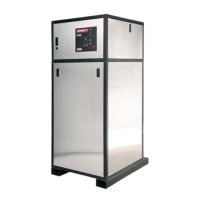DHW METHODS HeatNet Control V3
Page 38
This Method highlights the flexibility of the HeatNet
system. It works much the same as DHW METHOD 1, but
also has the ability to provide space heating and failsafe
functions. With a three boiler system, and with any one
boiler down, the system can still provide space heating and a
DHW call seamlessly.
With this method the MASTER boiler will use two PID
controls to simultaneously maintain the DHW and space
heating setpoints. This method is determined by
SETTINGS: DISTRIBUTED CONTROL: MASTER
TYPE: COMBINATION.
This method utilizes a 10k thermistor connected to the
DHW Sensor input and the HEADER sensor input of a
MASTER boiler. Setting up the DHW portion of this
method is done via the menus in: SETTINGS: DOMESTIC
HOT WATER. For information on setting up the space
heating portion of this method, Refer to Heat Demand
Control Method 1 located in the CONTROL METHODS
section.
When this method is used (due to use of the DHW sensor),
the OR OVR input functions as an enable/disable. This
allows the DHW heating function to be enabled or disabled
much in the same way as the Heat Demand input for space
heating.
The MASTER does not use its pump globally when any
DHW boiler is called. The DHW pump is individually
controlled on each boiler that fires in DHW.
When using this method, a DHW band is also available in
the Home screen. The space heating band will be displayed
on the left and the DHW Heating band on the right.
When using MASTER TYPE: COMBINATION, the
MASTER will control DHW and Space Heating needs. If the
MASTER goes down or loses communication with the
MEMBER, a Failsafe mode is available to provide temporary
heat.
The DHW Failsafe mode is active when a MEMBER
boiler’s SETTINGS: FAILSAFE MODES: H-NET
COMMUNICATIONS LOST: ON. When this is set to on,
normal DHW heating using the OR OVR or DHW sensor is
disabled, even though there may be a DHW call on one of
these inputs.
When the MASTER Boiler’s communication is lost, and
after 10 minutes of not being restored, the DHW inputs
become active. The boiler now enters a standalone mode. The
Heat Demand on that boiler becomes active and not only runs
to provide failsafe space heating, but DHW heat as well. The
STATUS screen will display H-NET LOST.
If a thermostat is used, the boiler will run to Method 5A until
the thermostat input removes the DHW call. If a DHW
temperature sensor is used, the boiler will modulate to
maintain tank temperature. The DHW Call always has
Priority over space heating. A dual 10k sensor is available
that can be wired from one tank to two boilers.
The DHW Method 2 examples uses (3) boilers. The
MASTER controls the Space and Domestic needs, though it
is not a DHW boiler. Failsafe control is provided by wiring
the MEMBER boiler to the tank sensor (dual sensor is
optional) and any other system control needs the MEMBER
may require in its backup role. Then one of the local DHW
control methods can be used to implement DHW heating.
One advantage to this configuration is that a BMS can
control the system through the MASTER. It can also
monitor system status through a central location (MASTER
boiler) by a BMS, or HeatNet Online. This failsafe method
can also be used in Combination DHW/Space Heating.
Set up the MASTER boiler first:
1. Connect a 10k thermistor from the DHW tank’s sensor
well to J10B terminals on the MASTER, and connect a
Header Sensor to the SYSTEM HEADER input. Wire
any pump or valve from the DHW Pump relay’s
(normally open) contact to control flow of the heating
water into the tank’s coil or DHW loop.
2. Now, set the SETTINGS: DISTRIBUTED
CONTROL: MASTER TYPE: to COMBINATION.
This setting informs the HeatNet control that (2) PIDS
are to be used to control DHW and space heating.
3. There are two MODULAR BOILER menus, one for
space heating and one for DHW heating. These (2)
menus appear when the SETTINGS: DISTRIBUTED
CONTROL: MASTER TYPE is set to
COMBINATION. The (2) Modular boiler settings are
located in the SETTINGS: MODULAR BOILER:
menu. Normally, there is only one, but with (2)
independent PIDs, the (2) heating setpoints may behave
differently due to their loads or for other various
reasons. These allow for separate ADD, SHED,
MODULATE DELAY TIME, and MODULATION
MAXIMUM settings for DHW and space heating.
4. Next, enter the SETTINGS: DOMESTIC HOT
WATER menu. When prompted for BOILER MODE
enter AUTO.
5. Change the DHW SETPOINT to the desired target
temperature of the water in the tank/ or DHW loop.
Once the control determines there is a call for DHW
heat, the DHW PID will target this SETPOINT.
6. Now, change the LOWER BAND to the desired
temperature (DHW SETPOINT – LOWER
BAND) below which boilers are to be added.
This setting corresponds to the minimum water
temperature required in the tank. DHW heating
will be initiated by starting boilers when the
DHW tank’s water temperature is below the
temperature (DHW SETPOINT – LOWER
BAND).
7. Next, change the UPPER BAND to the desired
temperature (DHW SETPOINT + UPPER
BAND) above which boilers are to be shed. This

